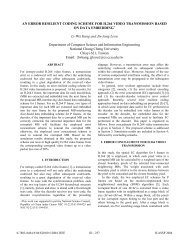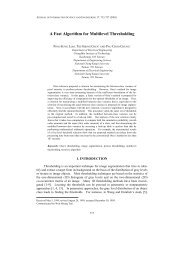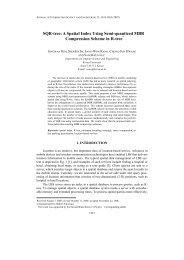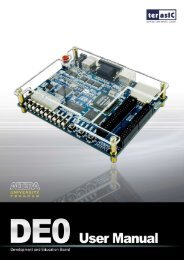Design, Implementation, and Performance Evaluation of Flash ...
Design, Implementation, and Performance Evaluation of Flash ...
Design, Implementation, and Performance Evaluation of Flash ...
You also want an ePaper? Increase the reach of your titles
YUMPU automatically turns print PDFs into web optimized ePapers that Google loves.
FLASH MEMORY-BASED FILE SYSTEM ON CHIP<br />
tions, which is important factor <strong>of</strong> the interoperability. Our contribution in the theoretical<br />
aspect is in presenting a performance analysis based on a theoretical model <strong>and</strong> validating<br />
the model through experiments using an FSOC implementation. Although the approach<br />
<strong>of</strong> <strong>of</strong>f-loading part <strong>of</strong> host work to the storage device is not new, our work is the<br />
first attempt to apply it to the embedded system such as portable storage to our knowledge.<br />
In such circumstances the models <strong>and</strong> performance analysis results from previous<br />
work cannot be directly applied as the environment <strong>of</strong> embedded systems is restrictive.<br />
The rest <strong>of</strong> the paper is organized as follows. Section 2 presents works related to<br />
this paper <strong>and</strong> section 3 describes the design <strong>and</strong> implementation <strong>of</strong> an FSOC in a <strong>Flash</strong><br />
memory card. In section 4, performance models <strong>of</strong> FSOC <strong>and</strong> a conventional storage<br />
device are presented, <strong>and</strong> the performance <strong>of</strong> these devices is compared using the presented<br />
model. In section 5, a performance comparison <strong>of</strong> the implemented FSOC <strong>and</strong> a<br />
conventional storage device is presented. Finally, we provide a summary <strong>and</strong> conclude in<br />
section 6.<br />
2. RELATED WORK<br />
The FSOC approach, that is <strong>of</strong>f-loading file system work to a storage device, is not<br />
a new idea. There have been several previous research results that consider performance<br />
<strong>of</strong> intelligent storage devices [8, 10-13]. However, in these studies the storage device <strong>of</strong><br />
interest is disk storage <strong>and</strong> their main concern is in regards to exploiting parallelism<br />
among the storage devices. In this section, we describe some <strong>of</strong> the previous research<br />
that utilizes additional resources within the storage device to improve performance <strong>and</strong>/or<br />
functionality. In contrast to these works, our work is more apt to storage devices that can-<br />
not exploit this kind <strong>of</strong> parallelism such as portable storage devices that are becoming<br />
more <strong>and</strong> more prevalent. In this section, we also describe research on <strong>Flash</strong> memory,<br />
which is the platform on which we implement our FSOC.<br />
Active disk [8, 10] IDISK (Intelligent Disk) [11], <strong>and</strong> OSD (Object-based Storage<br />
Device) [14, 15] are some <strong>of</strong> the research efforts that are targeted to improve the performance<br />
<strong>and</strong>/or functionality <strong>of</strong> storage devices. In the Active disk approach, a portion<br />
<strong>of</strong> the application code is downloaded <strong>and</strong> executed in the storage device to reduce the<br />
data traffic <strong>and</strong> to improve the performance <strong>of</strong> data-intensive portions <strong>of</strong> the application.<br />
The IDISK proposes an architecture that uses a high-speed network to interconnect multiple<br />
disks that have application code execution capabilities. This architecture improves<br />
application execution parallelism <strong>and</strong> can be used to improve efficiency <strong>of</strong> data-intensive<br />
applications such as decision support systems. Finally, in OSD, which is most closely<br />
related to FSOC, interoperability is enhanced by making OSD responsible for locating<br />
data blocks. However, OSD is different from FSOC in that OSD manages data in the<br />
form <strong>of</strong> objects rather than files, <strong>and</strong> naming <strong>of</strong> files <strong>and</strong> managing directories remain the<br />
responsibility <strong>of</strong> the host. Moreover, the main purpose <strong>of</strong> OSD is in constructing storage<br />
appliances, whereas the purpose <strong>of</strong> FSOC is in providing portable storage that can be<br />
used by mobile devices.<br />
Riedel et al. proposed a performance model for Active disk [12, 13]. The performance<br />
model for Active disk was focused on parallelism among storage devices that execute<br />
part <strong>of</strong> the host application. It is similar to our model in that it models the perform-<br />
1867











